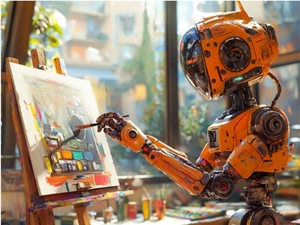Former Google CEO Eric Schmidt recently expressed his concerns about the potential risks of artificial intelligence (AI) technology during an interview with the BBC. He pointed out that terrorists and "rogue states" might exploit AI technology to harm innocent people, particularly the possibility of creating biological weapons.

Image Note: The image is generated by AI, provided by the service provider Midjourney
Schmidt mentioned that countries like North Korea, Iran, and Russia might adopt this emerging technology to carry out malicious activities. He emphasized that the rapid advancement of this technology means that anyone with malicious intent could quickly master and misuse it, leading to serious harm. He specifically referenced a scenario similar to "Osama bin Laden," stating that if certain evil individuals gain control of modern technology, it could pose a significant threat to innocent populations.
Schmidt called for effective government regulation of private tech companies developing AI, believing that this could mitigate the risks of technological misuse. However, he also warned that excessive regulation might hinder innovation. He stated that the future of AI is primarily shaped by private companies, and the government needs to provide appropriate oversight to ensure the safe use of their technologies.
Regarding the U.S. export control policies, Schmidt expressed support for limiting the export of powerful microchips to certain countries to slow down competitors' progress in AI research. He mentioned that former President Joe Biden had restricted chip exports to all but 18 countries, a decision that could potentially be reversed by Trump in the future.
When discussing the impact of social media and smartphones on children, Schmidt voiced concerns about children's safety. He believes that while smartphones can be safe, their use should be moderately regulated to protect children from the dangers of the online world. He advocates for limiting social media usage for children under 16 and considers it irresponsible to conduct large-scale, uncontrolled experiments on the next generation.
Schmidt's remarks have drawn attention at the recent AI Action Summit, where the U.S. and U.K. refused to sign the agreement, sparking widespread discussion. He called for a balance between regulation and innovation in AI development to ensure that technological advancements do not harm society.
Key Points:
🛡️ Schmidt is concerned that AI technology could be misused by terrorists and "rogue states," causing harm to innocents.
⚖️ He urges government regulation of private tech companies while being wary that excessive regulation could stifle innovation.
📱 Concerns about the impact of smartphones on children have been raised, with Schmidt advocating for restrictions on minors' use of social media to protect their safety.









